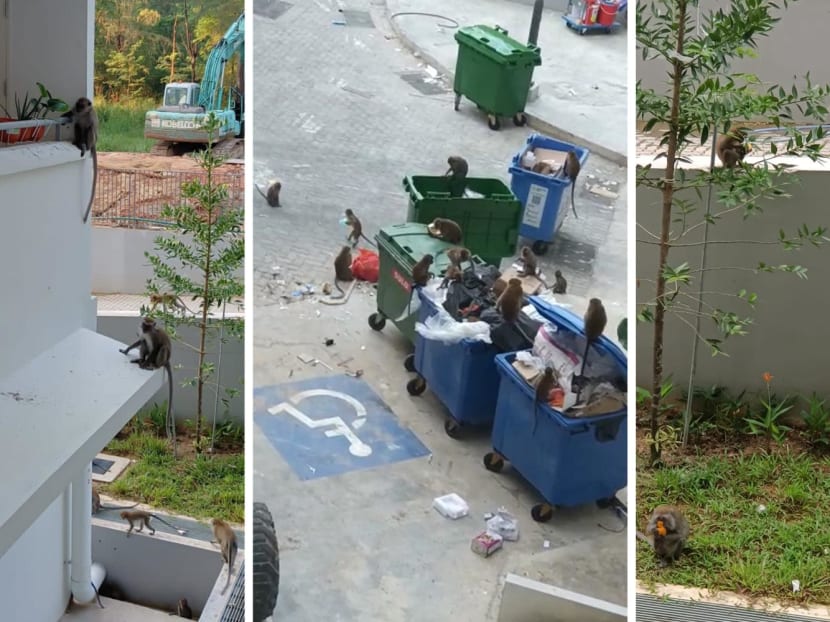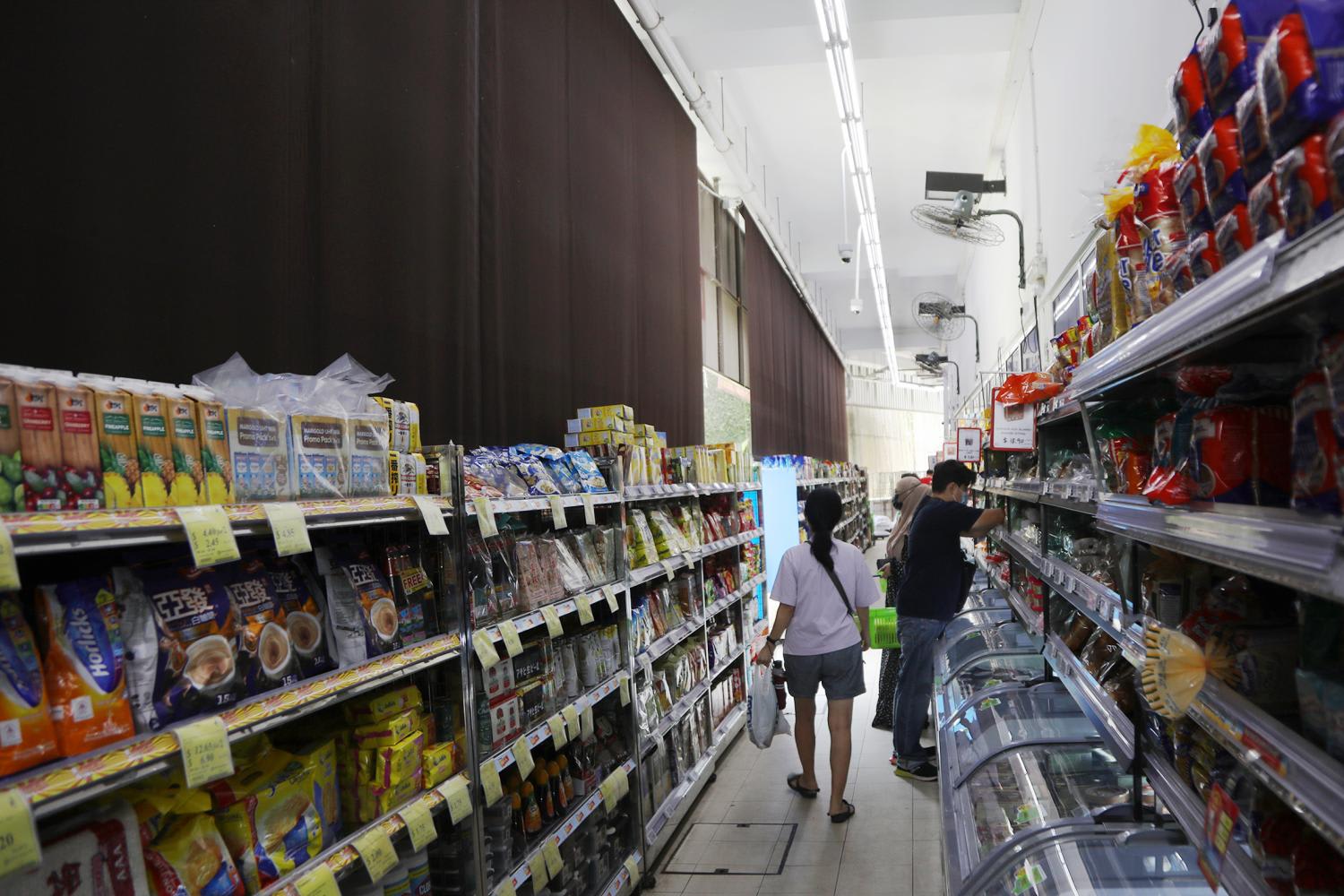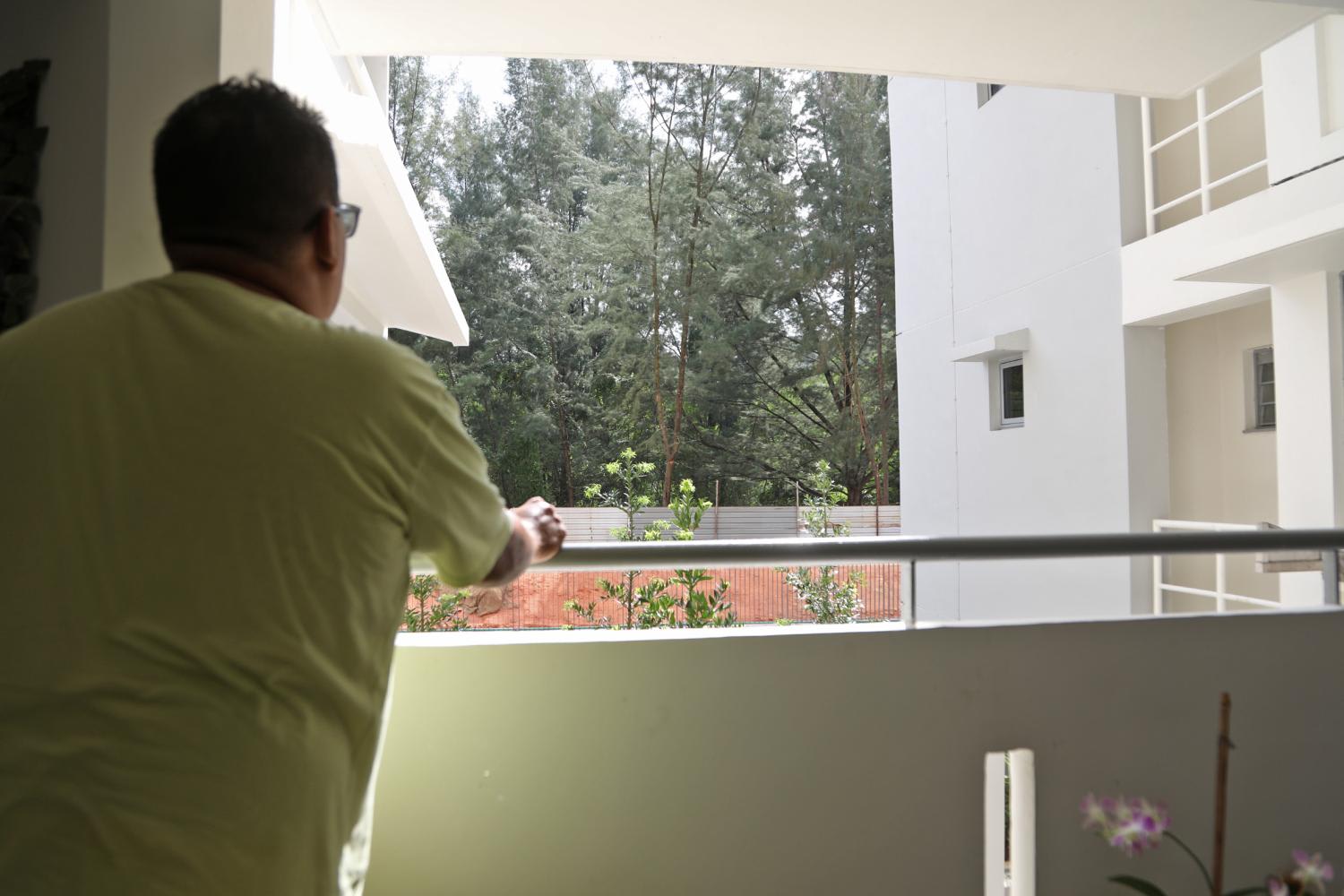Some Punggol East residents, shopkeepers concerned about monkeys damaging property, stealing food and trying to enter homes

A composite photo showing long-tailed macaques in parts of the Punggol East estate.
- Punggol East residents told TODAY that they have seen more long-tailed macaques in their estate attempting to enter homes and damaging their property
- Shopowners in the area have also reported having food stolen
- A primate researcher said human food is the key driving force for the monkeys to encroach human-populated areas
- Some things residents should do include keeping food secure and out-of-sight of monkeys, and to remain calm if they encounter the animal
SINGAPORE — When Mr Abdul Rahim moved into his new home at Waterway Sunrise 1 in Punggol three months ago, he was looking forward to living in an estate that faces the Lorong Halus Bridge with a view of Coney Island.
What the 48-year-old security supervisor did not expect was a group of furry neighbours making daily visits to his estate — a family of at least 20 long-tailed macaques.
“I see them almost every day in the morning and after lunch at around 2pm, (rummaging) through the rubbish bins downstairs and sitting on the ledge near my corridor,” he said.
For residents and shop owners living and working in the housing estates of Waterway Sunrise 1, Waterway Sunray and Waterway Sundew — located next to one another along Punggol Waterway — monkeys rummaging through bins, stealing food and sometimes damaging property are a common sight.
One bakery and two supermarkets along the stretch of developments told TODAY that the monkeys have stolen food from their premises.
In January last year, TODAY reported on increased monkey sightings in the area. Residents said then that it was largely confined to the vicinity of Waterway Sunrise 1, which was still under construction at the time, and not in populated areas.
Now, residents and shop owners are saying that the monkeys would come out of a forested area just behind Punggol Waterway and Coney Island, and search for food in Waterway Sunrise 1 where new residents have settled.
The group of monkeys would then visit Waterway Sunray, where shop owners said that they last stole food on Monday (July 11).

Employees at a supermarket in the Waterway Sundew development — about 800m away from the Lorong Halus Bridge — told TODAY that the monkeys have visited “almost daily” since last Sunday. The bridge straddles the Serangoon Reservoir, linking the Lorong Halus Wetland and the Waterway Sunrise development in Punggol East.
The exact route the monkeys use to travel between the estates in the past week is unclear, but the supermarket employees said that they have spotted the creatures looking for food in rubbish bins along Punggol Waterway, leading them to believe that it is the path the monkeys take.
FRUITS, BREAD AND NOODLES AMONG MONKEYS' LOOT
Ms Sherie Chan works a cashier at supermarket Hao Mart at Block 658 Punggol East in the Waterway Sunray precinct. She was going about her usual work routine on Monday when a group of about 10 monkeys ran into the supermarket at around 7.50am.
“I was so shocked, I didn’t know what to do because we didn’t expect it,” she said, adding that the monkey’s heist included a bunch of bananas and an apple.
“One of my colleagues tried to chase them away from the supermarket by making noise, but one was quite ferocious and charged at him with its teeth showing.”
All that was left was a bitten apple, which the monkeys dropped when they were scared off and fled.
Employees at 126 Bread and Cake House — a bakery located at the same Block 658 Punggol East — told TODAY that the monkeys also visited the shop at 7am on the same day, getting away with four pieces of bread.
One employee who did not want to be named said: “It’s the first time we’ve encountered this, but we haven't seen them since.”
At Sheng Siong supermarket located at Block 660A Edgedale Plains in Waterway Sundew, shop blinds used to protect goods from rainy weather have been lowered in a bid to prevent the monkeys from taking away food.
Ms Lucy Doan, 43, who has been working at the supermarket for three months, said that the monkeys have visited “almost daily” after getting away with a pack of instant noodles on Monday.
She said that a group of about 10 monkeys had grabbed the noodles that were displayed outside the shop with other goods. Workers at the supermarket and customers helped chase the monkeys out, but they proceeded to poke around two trash bins outside the shop.
“People (were) looking and taking videos of the monkeys eating and digging through the rubbish bin… they don’t seem afraid,” she added.
However, for shops that do not handle food, the owners said that they were not worried about the monkey sightings.
Ms Sandy Cheah, owner of bicycle shop Buycycle at Block 658 Punggol East, said: “They’re looking for food, so they don’t care about the shops like ours.”

Mr Abdul's brushes with the macaques have increased his fears that the animals might cause more damage if nothing is done, especially since he lives on the second level of a public housing block that he believes make for easy access by climbing.
“I’ve seen the monkeys jump the fence that was meant to keep wild boars out, and they will rummage through the bins that are just below my block,” he added.
“My son was playing with his scooter along the (corridor outside the flat) when the monkeys approached him. He got scared, threw down his scooter and quickly ran into the house.
“I’m worried that the monkeys might get aggressive,” Mr Abdul said.
Just last month, the monkeys jumped onto his newly polished motorcycle, leaving scratches and muddy hand prints on the seat.
Another time, the monkeys were loitering around his flat's main door, leading him to believe that they wanted to enter his home.
He tried seeking help from the estate’s Building Service Centre, but he was told there was nothing that could be done about the monkeys.
He approached the centre, which is set up by the Housing and Development Board to handle building defects, because he frequently spotted the monkeys within construction sites in the estate.
For now, a mesh gate installed to keep his cat within his home doubles as his main defence to keep the monkeys out of his home.
Of 10 residents who spoke to TODAY, eight have seen the monkeys, while two had not because they are still in the process of moving into their newly completed flats.
Mr Johnson Poh, 46, a part-time delivery driver, said that he saw the monkeys entering a temporary holding site for construction workers last Sunday, though the holding site has since been removed.
“I’m worried the monkeys might enter because my house is quite warm, so we leave the windows open to ventilate (it),” he said.
As for a 38-year-old housewife who declined to be named, spotting infant monkeys has increased her concern that they would grow in numbers.
“Just last week, (about 10 monkeys) came up to our balcony and tried to enter (our home). Luckily, we had the balcony door closed so they couldn’t enter,” she said. She lives on the second floor of the housing block.
“We are near a forested area, so this is just something we have to live with. After all, there’s nothing much we can do.”

Primate researcher Sabrina Jabbar said that human-wildlife conflict in the Punggol East area has been increasing because of human food available for the macaques.
“They are rewarded and motivated by human food that is high in sugar and fat, so they might venture further out into more human estates if it is easily available,” she added.
WHAT TO DO TO AVOID CONFRONTATIONS
Some things residents can do to prevent conflict with the macaques include blocking them from seeing food within their homes, such as using containers that are not transparent and keeping them in cupboards. “When they see food, they will remember and have a mental map of where to find food,” she explained.
Aside from that, residents should ensure that windows are closed, especially during times when the monkeys are known to visit.
“The macaques are drawn to eat flowers, aside from fruits. We’ve also observed them chewing on raw onions and chillis,” she said.
In response to TODAY’s queries, Dr Adrian Loo, group director of wildlife management at the National Parks Board (NParks), said that the number of feedback cases on monkeys in the Punggol East area has not increased from 2021 to 2022, although he did not give exact figures.
“In the case of managing long-tailed macaques, science-based population management options include habitat modification, carrying out studies to understand the population ecology, managing the movement of macaques, and relocation,” he said.
“In areas where macaque encounters occur often, mitigation measures such as making human food less available are used.”
For example, NParks enforce action against people feeding wildlife, ensures proper waste disposal, harvests fruit trees and installs monkey-proof fittings. It also does monkey guarding, which guides monkeys towards forested areas by blocking their approach.
The agency is also studying long-term population measures such as sterilisation, which “will be implemented when suitable”.
Dr Loo said that feeding the macaques causes the animals to associate humans with food, resulting in assertive behaviours such as grabbing plastic bags and food containers and becoming habituated to humans.
Feeding the primates also affects the agency’s macaque management efforts, and is an offence under the Wildlife Act.
Anyone caught feeding monkeys is liable to a fine of up to S$5,000 for a first offence, and a maximum fine of S$10,000 for a second or subsequent offence.
“NParks would like to advise the public to appreciate and respect wildlife in our 'City in Nature' from afar and avoid disrupting their natural behaviours,” Dr Loo said.
If approached by a macaque, he advised: “Remain calm and quiet and do not make any sudden movements or maintain eye contact with them. Instead, look away and back off slowly. Keep away from the area until they have left.”
Members of the public may call the 24-hour Animal Response Centre at 1800-476-1600 for wildlife-related issues.











